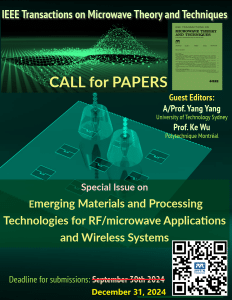
IEEE Transactions on Microwave Theory and Techniques
Special Issue on
Emerging Materials and Processing Technologies for RF/microwave Applications and Wireless Systems
Submission Deadline: December 31th, 2024
Motivation:
Novel materials, processes and manufacturing technologies have emerged in recent years, which have shown great potential in the development of RF/microwave and wireless systems and applications. Over the last 20 years, there has been a growing interest in RF/microwave materials and fabrication techniques, which enable the creation and innovation of devices, microwave circuits and systems over MHz-through-THz. This Special Issue on Emerging Materials and Processing Technologies for RF/Microwave and Wireless Systems and Applications is to promote this area by providing excellent opportunities for cross-disciplinary researchers and practitioners to share the recent progress on microwave materials and fabrication techniques.
The scope of this T-MTT Special Issue includes emerging RF/microwave materials and fabrication processes, which should present significant potential in advancing future RF, microwave, millimeter-wave, terahertz devices, circuits, and systems. This cross-disciplinary area brings together researchers, scientists, and engineers of different backgrounds to promote and exploit emerging and novel materials, processes, and manufacturing techniques. This also provides opportunities for the MTT-S community to share cross-disciplinary R&D activities and outcomes. Publishable manuscripts may include but not be limited to material engineering, chemical engineering, photonics/optical engineering, mechanical engineering and process engineering.
Proposed Field of Interest:
- Additive Manufactured (3D printed) Microwave Components and Systems:
- Additive Manufacturing techniques for RF device fabrications, such as fused deposition modelling (FDM), continuous liquid interface production (CLIP), and selective laser sintering (SLS).
- Dielectrics materials for RF circuit designs: Low-loss materials, high dielectric constant materials, phase-changing materials.
- Metallic materials for RF circuit designs: steel, silver, copper, and alloy.
- Multimaterial 3D printing, e.g. dielectric and conductive materials.
- Bioprinting in microwave applications
- Emerging Fabrication and Processing Techniques for Microwave Applications:
- Subtractive processing: precision CNC for prototyping microwave devices
- Hybrid manufacturing for RF applications: additive and subtractive hybrid processing
- Materials coating techniques for RF components
- Multimaterails fabrication for microwave circuits
- Nano/micro processing techniques for RF/microwave devices and circuits
- Heterogeneous integration and processing techniques
- Functional RF Materials for Microwave Circuits and Systems:
- Shape-memory materials for RF designs: Shape-memory alloy and shape-memory polymer
- Electromagnetic absorbing materials/magnetic materials
- Phase-tunable materials
- Magnetic materials and multiferroics
- RF materials formulation
- Tunable RF materials stimulation/modeling techniques
- Material training/stimuli strategies: Electrical, heat, light, magnetic waves
- Next generation of semiconductors, including emerging wideband gap and oxide materials
- Characterization of materials for microwave applications
Guest Editors:
A/Prof. Yang Yang
yang.yang-1@uts.edu.au
University of Technology Sydney, Australia
Prof. Ke Wu,
ke.wu@polymtl.ca
Polytechnique Montréal, Canada